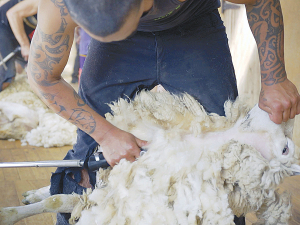Top wool advocate bales out
The conversion of productive farmland into trees has pretty much annihilated the wool industry.
 Australia fears a shortage of shearers after New Zealand shearers return home once our borders reopen.
Australia fears a shortage of shearers after New Zealand shearers return home once our borders reopen.
In a twist on the usual formula, Australia fears a shortage of shearers in that country after New Zealand shearers return home once our borders reopen.
With NZ's border opening up but Western Australia's tightening, many Kiwi shearers who were in Australia when our borders were locked down in March 2020 will now have the opportunity to return home - without needing an MIQ slot.
However, many who choose to return home to NZ will find it difficult, if not impossible, to return to Western Australia. New Zealand's borders will open to fully vaccinated Kiwis and other permanent residents travelling from Australia starting from February 27. However, despite Prime Minister Scott Morrison's plan for Australia's borders to open internationally on February 21, Western Australia is going a different way. That state is taking a tighter approach to regional travel and capping foreign visitors at 265 people a week following an Omicron outbreak.
NZ shearer Aromia Ngarangioni told Australia's ABC that about 60% of shearers currentl working in Western Australia are from New Zealand.
Like many, she has not seen her home since early 2020, when she returned to NZ for her mother's funeral.
It is likely many similar stories will be found among other returning NZ shearers, homesick or having business back home to sort out.
However, there is concern in Western Australia about the impact this will have on their sheep industry. With an exodus of talented shearers and border restrictions (both international and regional) making it difficult to find suitable employees, there are fears a shearer shortage could further impact an already stressed industry.
Shearing contractor Greg McAtamney runs several teams in the Great Southern region of WA.
"I'll probably lose six to eight people straight away, maybe more. That's an entire team," he told the ABC.
McAtamney says if this happens, he doesn't expect to meet farmers' needs for shearers at a crucial time of the year.
"A lot of sheep are due to lamb in April or May, so they need to be shorn four to six weeks before that for animal welfare reasons," he said.
Meanwhile, WA Liberal upper house member Steve Martin told the ABC the feared shearer exodus could make an already stressed industry worse.
"They [the shearers] work longer and longer hours," he said. "The farmers get their shearing dates pushed back."
A WA state government spokesperson said it was working closely with industry to manage the shearer shortage.
Agrisea NZ has appointed Craig Hudson as it's new chief growth officer.
State farmer Landcorp, trading as Pamu, is a forecasting a full-year net profit of around $100 million.
Tony Aitken, chief executive of Ruralco, has been awarded the Excellence in Business Leadership Award at the ANZ Business of the Year Awards.
Global trade has been thrown into another bout of uncertainty following the overnight ruling by US Supreme Court, striking down President Donald Trump's decision to impose additional tariffs on trading partners.
Controls on the movement of fruit and vegetables in the Auckland suburb of Mt Roskill have been lifted.
Fonterra farmer shareholders and unit holders are in line for another payment in April.

OPINION: Here w go: the election date is set for November 7 and the politicians are out of the gate…
OPINION: ECan data was released a few days ago showing Canterbury farmers have made “giant strides on environmental performance”.